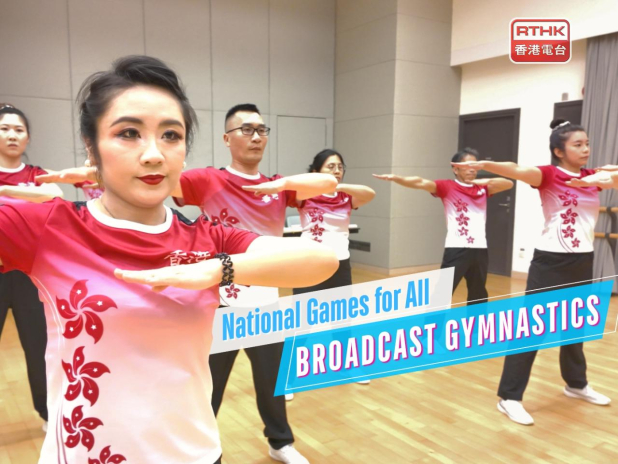National Games 'gymnasts' tout benefits of exercise - RTHK
A rhythmic fitness routine which began as a casual warm-up exercise in schools and workplaces has found its way to the National Games, after amassing a huge following on the mainland.
It's called broadcast gymnastics - a form of calisthenics often performed to music and guidance from radio programmes aimed at promoting healthy living.
The exercise is one of 23 mass participation events at the 15th National Games.
Eight provincial teams have emerged from preliminary rounds, while co-hosts Guangdong and Hong Kong gain direct entry to the finals.
Around 220 athletes will appear in the finals in Zhuhai this weekend, including 20 from the SAR.
Hong Kong team member Julian Law said the sport is designed for all ages and backgrounds, requiring only basic space and casual clothing.
"It is very common in mainland China to be applicable in their start of school, and start of work, and then after school, after work," she said.
"But for us, here in Hong Kong, it's actually quite a new sport... And we are the first ones in Hong Kong to be really performing this."
The Hong Kong team comprises four men and 16 women, aged between 31 and 60.
Law said members initially focused on individual performance, but gradually built chemistry through training as they focused on synchronisation and technical precision.
"For scoring, it's kind of like a mark deduction system. So we got marked by the angle of our limbs. So you have to be straight or 45 degrees and then 10 degrees less and 15 degrees less, there's going to be five marks deducted, 10 marks deducted," she explained.
"At the same time you're going to be marked by the artistic performance... rhythm with the music, how you be step on the beat, and also how we all synchronise together."
For fellow team member Fiona Liu, the sport is a piece from her childhood.
Growing up in Xi'an, she said broadcast gymnastics was a daily ritual for students.
Thirteen years after moving to Hong Kong, she still loves the sport for its inclusion and hopes more people can learn about it.
"Some of the professional athletic activities are done under the age of 28, even the age of 25. But this kind of activity is done throughout all age ranges and all kinds of people. Even if you got hurt in the early years... you can do this kind of sport too," she said.
Liu said she hopes more Hong Kong schools can adopt the routine to ease academic stress and foster friendships.
"They don't have to rank first in the game, they just have to take part in it, and to get to know everyone in the class, and to have a way to know everyone in the morning."

